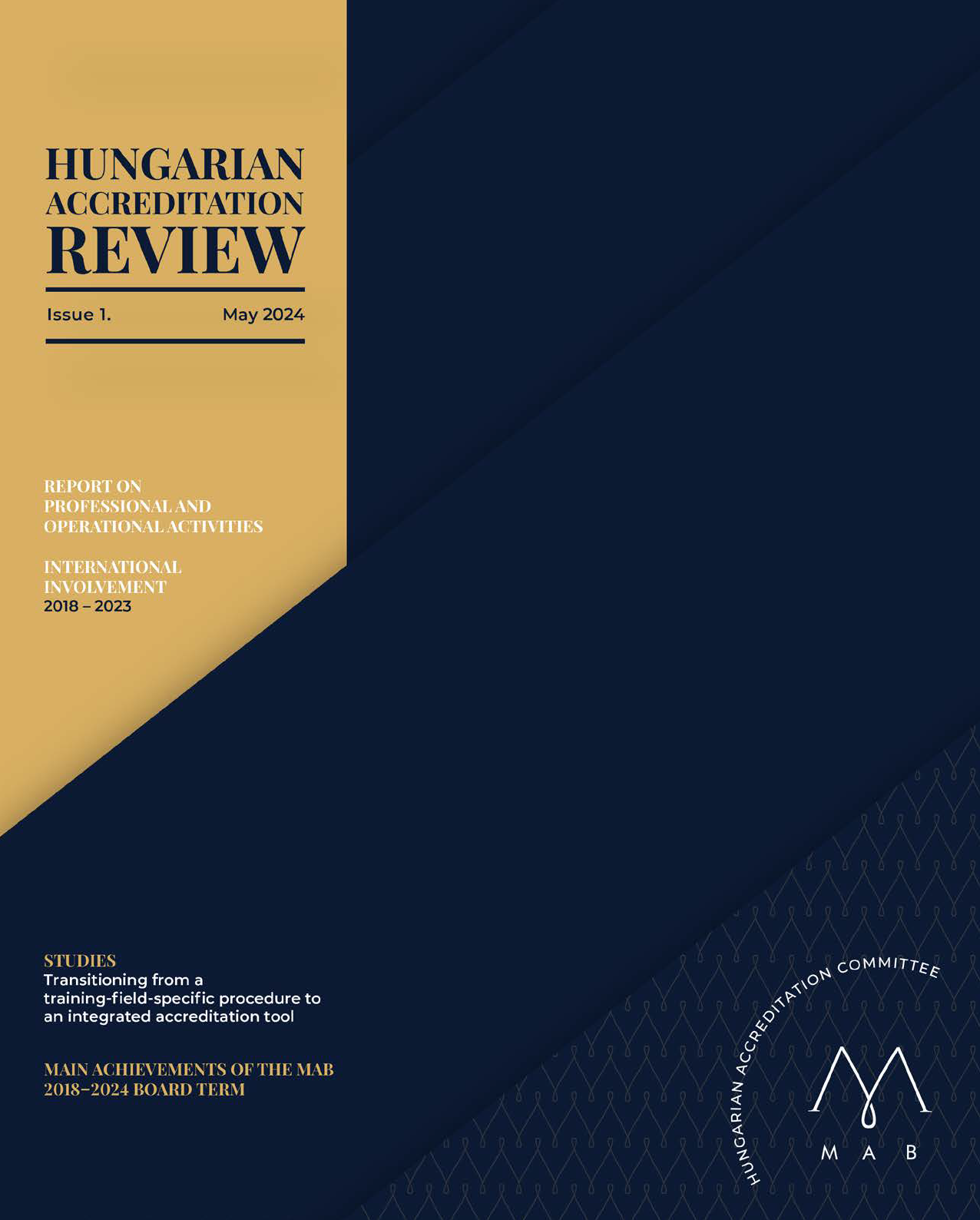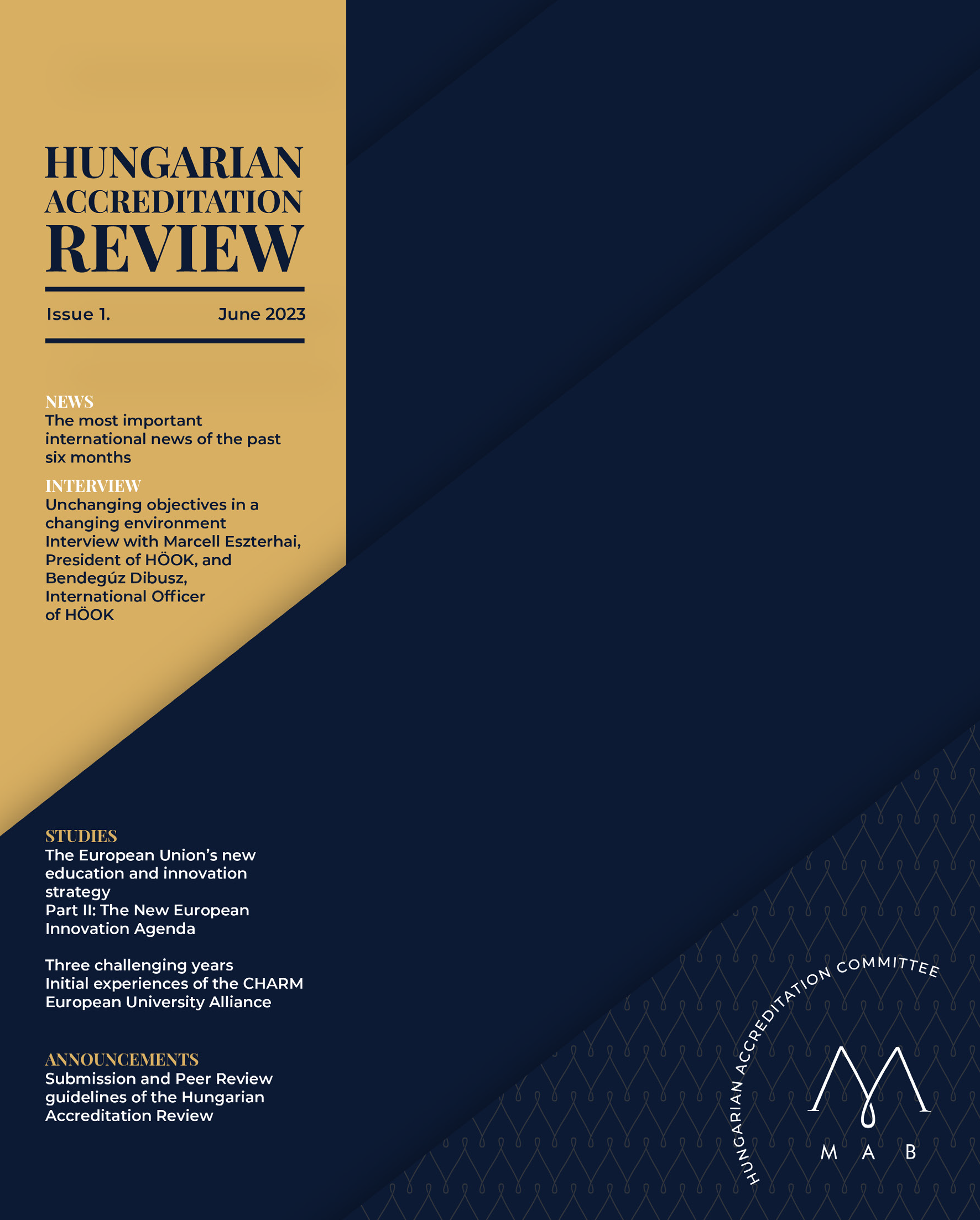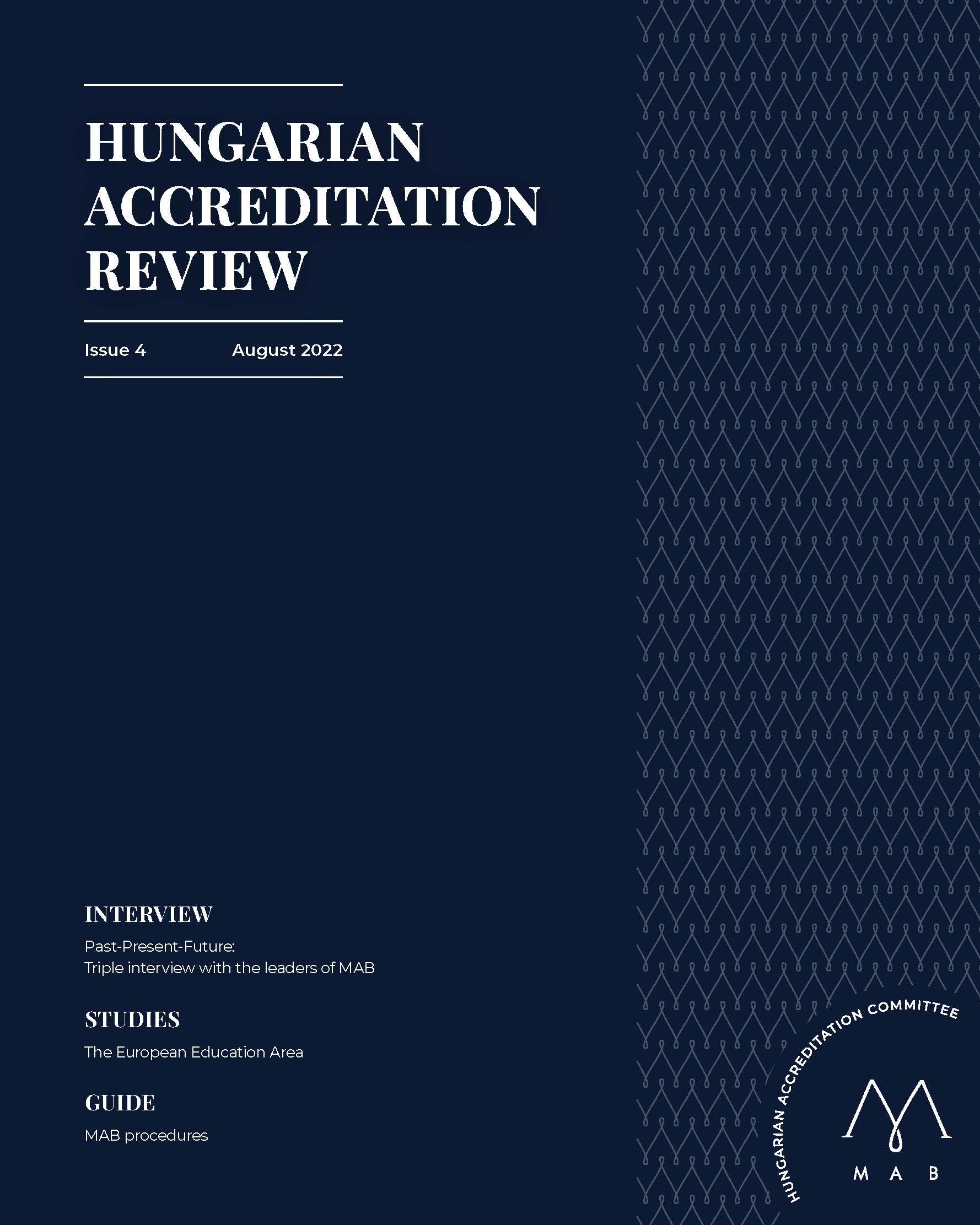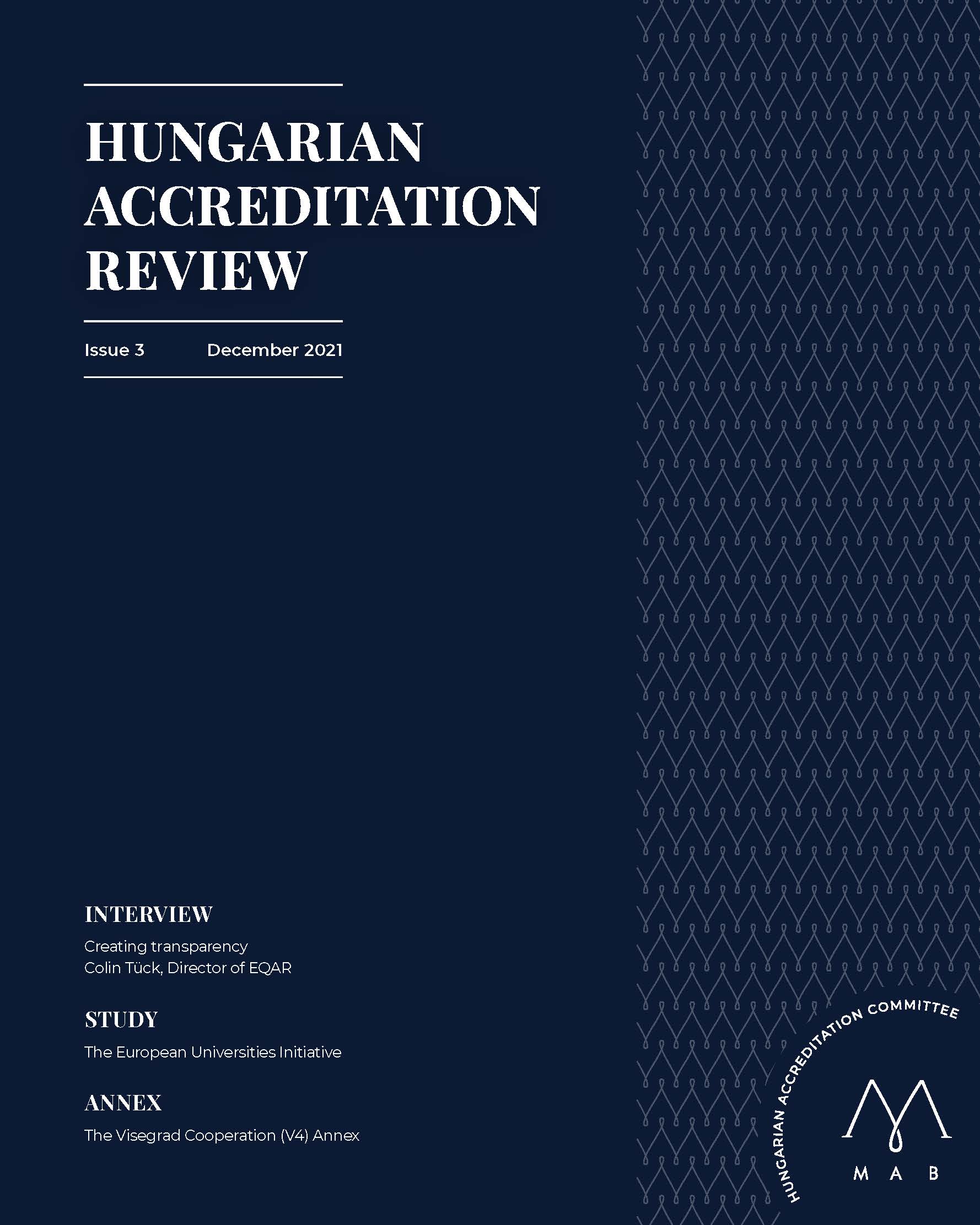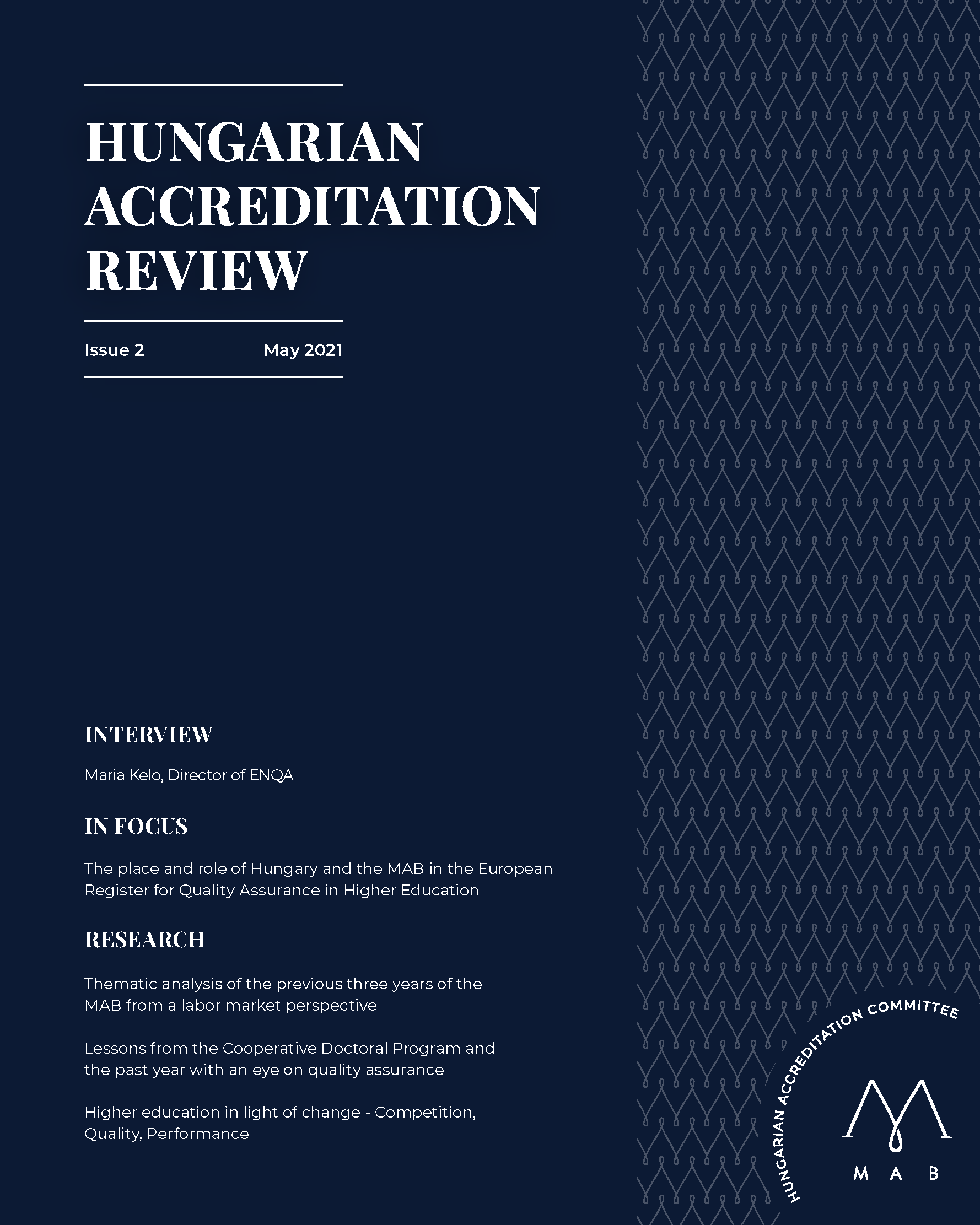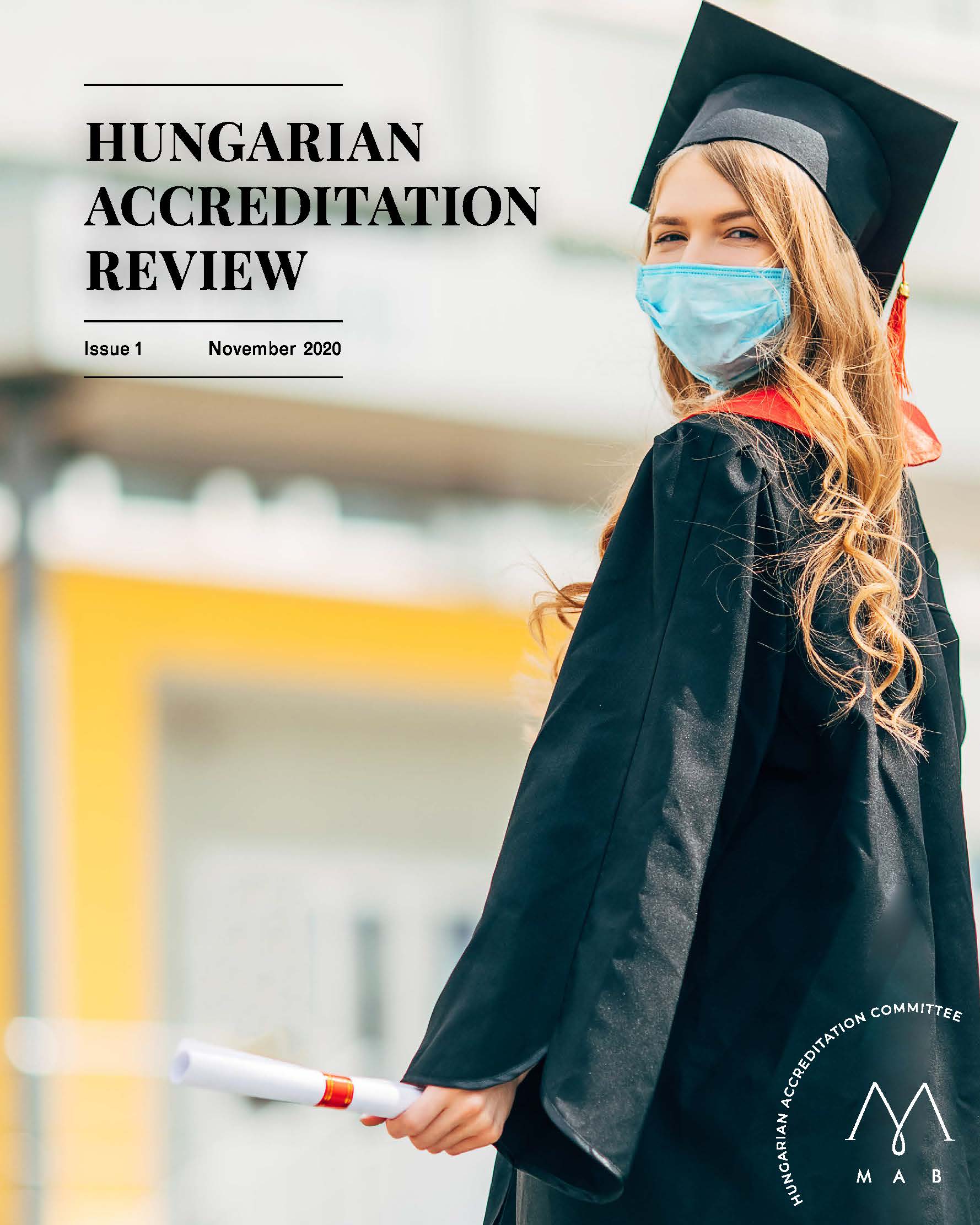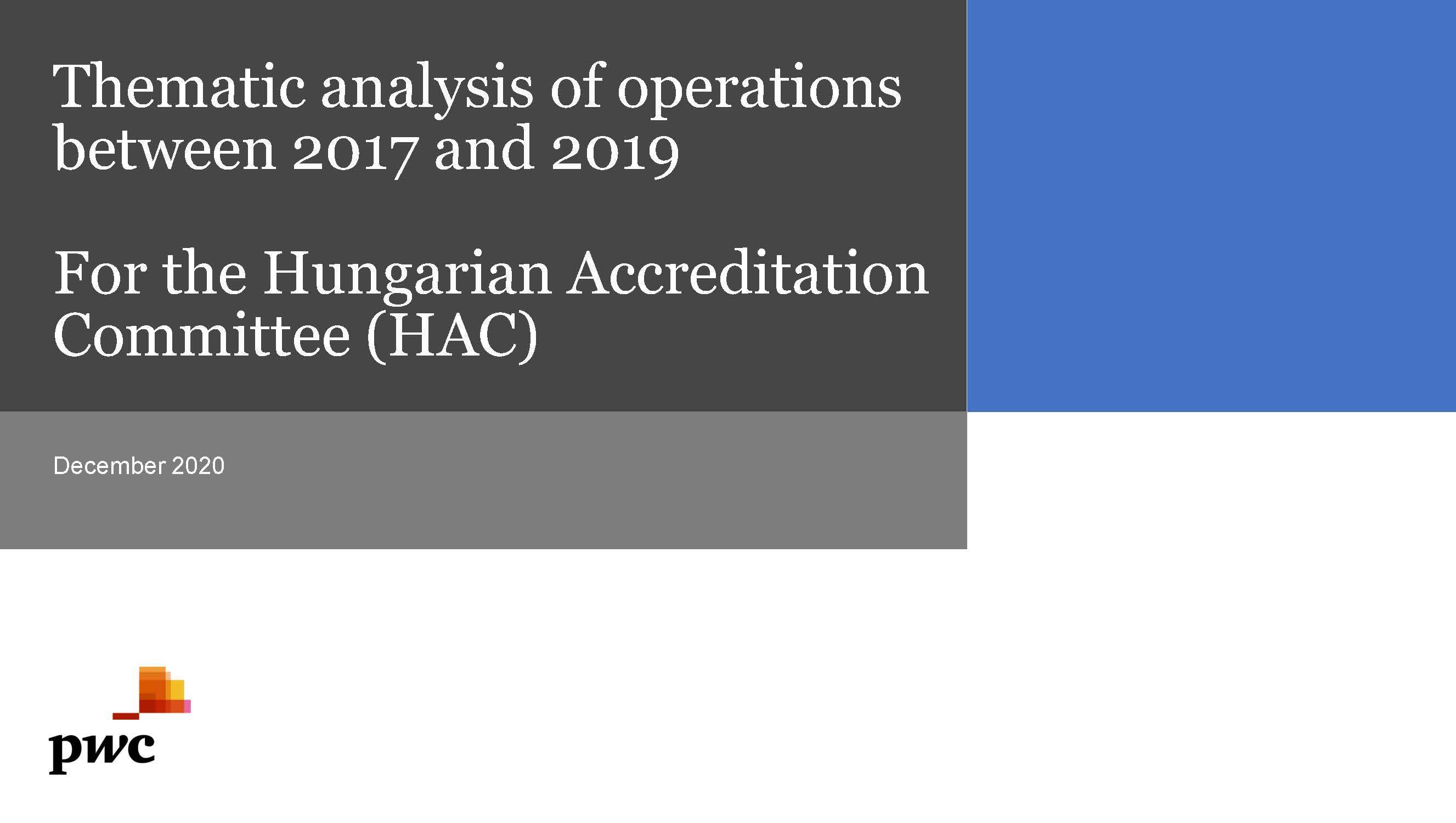MAB
The Hungarian Accreditation Committee is a national-level, independent body of experts tasked with the external evaluation of the quality of educational and related research activities and the internal quality assurance (QA) systems of higher education institutions in Hungary. It operates within the scope of the Standards and Guidelines for Quality Assurance in the European Higher Education Area (ESG). The Board is comprised of 20 higher education experts, students and external stakeholders and is the highest decision-making board. It determines the by-laws, rules of procedure, organisational framework and evaluation and accreditation criteria and procedures, and passes resolutions on accreditation decisions. Expert committees and a Secretariat contribute to its operations.
In addition, the MAB has two statutory boards, a Financial Supervisory Board and a Board of Appeals. The latter board of three independent members handles appeals against the MAB’s decisions and, in line with internal regulations, may deal with complaints against procedures. An International Advisory Board provides guidance and recommendations for the MAB’s work.
The MAB scope of activities extends to
- initial (ex ante) accreditation of new institutions
- initial evaluation of education and learning outcome framework requirements of Vocational Education and Training (VET) programmes
- initial evaluation of education and learning outcome framework requirements of Bachelor programmes;
- initial evaluation of education and learning outcome framework requirements of Master programmes;
- initial accreditation of VET programmes;
- initial accreditation of Bachelor programmes;
- initial accreditation of Master programmes;
- initial accreditation of new doctoral schools at universities;
- accreditation (ex post) of institutions in five-year cycles;
- accreditation of doctoral schools in maximum five-year cycles;
- WFME standards-based accreditation of basic medical programmes.
The MAB may evaluate running Bachelor and Master programmes if requested by an institution or the ministry. Additionally, it evaluates applications for awarding university professor positions.
The National Higher Education Act of 2011, lists some 70 higher education institutions operating in Hungary. In order to receive state recognition and to issue degrees, all higher education institutions, including private ones, must be accredited. Denominational higher education institutions receive state financing similar to state institutions and are accredited but the MAB’s mandate pertains only to secular programmes. Foreign higher education institutions are also required to be evaluated in order to receive license to operate from the Educational Authority of the Ministry of National Resources. A precondition is that they are legally recognized as HEI in their home country.
MAB’s Mission Statement
The Hungarian Accreditation Committee (MAB) is an independent national expert body established to conduct external evaluations of the quality of education, scientific research, and artistic activities in higher education institutions, as well as the operation of their internal quality assurance systems.
The main task of MAB is to carry out evaluation activities that promote high-quality and modern education, learning, research, and development in Hungary’s higher education institutions. MAB ensures comprehensive and inclusive quality assurance, engaging all relevant stakeholders across different levels of education. Its quality assessment and accreditation tasks are performed in compliance with national higher education regulations. These tasks are carried out following the criteria set by the Standards and Guidelines for Quality Assurance in the European Higher Education Area (ESG), applying objective evaluation criteria developed by its Colleges and approved by the MAB Board, along with complex and modern procedures appropriate to each task.
MAB strengthens its independent operations through its activities, employing and developing internationally recognized methodologies for evaluation. Its expert, accreditation, analytical, and advisory activities are built on objective criteria aligned with international standards. These activities are conducted independently, impartially, and free from political influence. MAB supports higher education institutions in enhancing their internal quality assurance culture, contributing to the effectiveness of Hungarian higher education, improving its quality management practices, and strengthening its international competitiveness and recognition.
MAB’s internal quality assurance principles (quality policy) are outlined in a separate document.
MAB’s main objectives
As a full member of the European Association for Quality Assurance in Higher Education (ENQA), a registered organization in the European Quality Assurance Register for Higher Education (EQAR), and an organization recognized by the World Federation for Medical Education (WFME), MAB’s main objective is to provide comprehensive expert support for the competitiveness of Hungarian higher education.
In order to achieve these goals, MAB:
- evaluates the compliance of higher education institutions and their training programmes in line with ESG standards and guidelines (and in the case of medical education, the WFME-BME standards);
- Supports higher education institutions in achieving their own quality goals and in continuously developing their internal quality assurance activities in line with the Plan-Do-Check-Act (PDCA) principles;
- Fulfils national and international accreditation (quality assurance) requirements, conducting cyclical accreditation procedures to determine whether institutions and their programs meet the ESG standards;
- Verifies and accredits institutions that meet the standards and provides recommendations for further development in its evaluation reports.
MAB’s evaluation activities
MAB’s evaluation activities include the reviewing the applications for university professorships based on the criteria defined in the National Higher Education Act; conducting international accreditation of medical education in accordance with WFME’s standards for basic medical education; carrying out its core responsibilities related to the establishment and launch of higher education programs.
MAB’s Comprehensive Strategic Goals (2025-2030)
Context:
MAB has successfully achieved the overall goals of its previous strategic period (2019-2024), which included (enhancing quality assessment processes Increasing national and international engagements/activities, introducing a new accreditation system for doctoral schools, strengthening external stakeholder participation in MAB’s activities, and conducting and publishing thematic analyses).
For the upcoming strategic period, MAB defines its comprehensive goals based on the foundation laid in the previous cycle, insights gained from European Higher Education Area (EHEA) organizational structures, and related trends, analyses, thematic professional, and policy documents and recommendations.
Strategic Goals for the Upcoming Period:
- Further strengthening the institutional accreditation: Implementing an integrated accreditation procedure that evaluates institutions and all their study programmes (including doctoral programs) collectively, ensuring a more modern and comprehensive quality assurance process in alignment with EHEA and European Union (EU) higher education trends.
- Advancing internationalization: Conducting accreditation procedures in English with internationally composed Site Visit Team and organizing international events on quality assurance.
- Simplifying and expediting the establishment and launch procedures for higher education programmes: in this context, enhancing institutional autonomy with regard to internal quality assurance.
- Continuous development and updating of evaluation criteria and procedures: Adapting to the evolving landscape of digital teaching and learning, micro-credentials, and artificial intelligence while ensuring academic integrity and effectively implementing new procedures.
- Training quality assurance experts in higher education and improving communication with quality assurance stakeholders: Strengthening collaboration with higher education institutions through regular professional training sessions and forums.
Standards and guidelines for quality assurance in the European Higher Education Area
Members of the Hungarian Accreditation Committee (from May 1, 2025) |
|
|---|---|
| Name | Position |
| Dr. János Ede Szilágyi | university professor |
| Dr. Éva Bácsné Bába | university professor |
| Mihály Balázs DLA | university professor |
| Dr. Zoltán Birkner | university professor |
| Dr. László Buday | university professor |
| Tamás Domokos | associate professor |
| Dr. Ágnes Engler | university professor |
| Dr. Szilveszter Füst-Molnár | college professor |
| Dr. Sándor Zsolt Imre | university professor |
| Dr. Sándor Keszthelyi | university professor |
| Dr. László L. Kiss | research professor |
| Dr. Eszter Lukács | associate professor |
| Dr. Veronika Müller | university professor |
| Dr. Gergely Lénárd Sándor | associate professor |
| Dr. István Seszták | college professor |
| Dr. Ágnes Veszelszki | associate professor |
| Dr. Zoltán Zéman | university professor |
| Dr. László Zentai | university professor |
| Marcell Eszterhai | President of HÖOK |
| Dr. Péter Vámosi | Vice President of DOSZ |
|
Members of the University Professors’ College
(from September 06 2024)
|
|||||||||||||||||||||||
|---|---|---|---|---|---|---|---|---|---|---|---|---|---|---|---|---|---|---|---|---|---|---|---|
|
|
Members of the Training College
(from 06 September 2024) |
|||||||||||
|---|---|---|---|---|---|---|---|---|---|---|---|
|
|
Accreditation College Members
(from 06 September 2024) |
||||||||
|---|---|---|---|---|---|---|---|---|
|
|
Members of the Doctoral Accreditation College
(from June 28, 2024) |
|||||||||||
|---|---|---|---|---|---|---|---|---|---|---|---|
|
|
Members of the College of Theology
(from 28 June 2024) |
||||||||||||||||||||
|---|---|---|---|---|---|---|---|---|---|---|---|---|---|---|---|---|---|---|---|---|
|
|
Members of the Medical Education Working Group
(from 6 September 2024) |
||||||||||
|---|---|---|---|---|---|---|---|---|---|---|
|
MAB Secretariat leaders |
|||||
|---|---|---|---|---|---|
|
MAB Secretariat officers |
||||||||
|---|---|---|---|---|---|---|---|---|
|
MAB Secretariat administrators |
|||||||||
|---|---|---|---|---|---|---|---|---|---|
|
IT staff of the MAB Secretariat |
|||
|---|---|---|---|
|
|
Committee Members
|
|||
|---|---|---|---|
|
Committee Members |
|---|
| Chair |
| Dr. Miklós Maróth – university professor, full member of the Hungarian Academy of Sciences |
| Members |
| Dr. Attila Császár – university professor, corresponding member of the Hungarian Academy of Sciences |
| Dr. Zoltán Nagy – professor emeritus |
The task of the SPB (Strategic Planning Board) is to follow the work of the MAB and to provide advise, especially in its annual meetings where, based on the MAB’s annual report and other documents, the SPB issues Recommendations. The MAB may also ask the SPB on occasion by mail to recommend experts for its external evaluations and to consult on other issues.
| Name | Workplace, Position |
|---|---|
| Dr. Christoph Grolimund | director, AAQ (Swiss Agency of Accreditation and Quality Assurance); former Chair of ENQA |
| Dr. Guy Haug | higher education consultant, lecturer at the University of Valencia |
| Dr. Padraig Walsh | former CEO of QQI, former Chair of ENQA |
| Ronny Heintze | Deputy Director, AQAS (Agency for Quality Assurance through Accreditation of Study Programmes) |
| Prof. Dr. Melita Kovačević | professor, former vice-rector of the University of Zagreb, steering committee member to the Institutional Evaluation Program (IEP) of the European University Association (EUA) |
| Prof. Dr Marilena Maniaci | member of the board at ANVUR (Italian National Agency for the Evaluation of Universities and Research Institutes), board member of HCERES (High Council for the Evaluation of Research and Higher Education, France) |
Since its establishment, the Hungarian Accreditation Committee (MAB) has been actively involved in international events and organizations related to quality assurance in higher education, maintaining an extensive network with key stakeholders in international quality assurance. As part of this engagement, MAB has participated in the quality assurance-related tasks and working groups of the Bologna Process and contributed to the revision of the Standards and Guidelines for Quality Assurance in the European Higher Education Area (ESG) through the QA-Fit project.
In addition to its ongoing and ad hoc international activities, MAB:
- is a full member of the European Association for Quality Assurance in Higher Education (ENQA);
- is registered on the European Quality Assurance Register for Higher Education (EQAR);
- is recognized by the World Federation for Medical Education (WFME);
- is recognized by the U.S. National Committee on Foreign Medical Education and Accreditation (NCFMEA), responsible for determining the equivalence of foreign medical education;
- is a member of the Central and Eastern European Network of Quality Assurance Agencies in Higher Education (CEENQA);
- is an initiator and founding member of the V4QA Forum, the quality assurance forum of the Visegrad Group countries;
- is a founding member of the Global Academic Integrity Network (GAIN);
- is an affiliate member of the European University Association (EUA);
- is a signatory of the Coalition of Advanced Research Assessment (CoARA) and a member of its national working group;
- participates in the Bologna Follow-up Group (BFUG) thematic peer group on quality assurance (TPG C on QA), responsible for monitoring the implementation of the Bologna Process;
- collaborates with over 14 European agencies through bilateral and multilateral formal agreements (Memoranda of Understanding);
- has participated in and continues to engage in various European higher education quality assurance projects in different expert and coordination roles (DEQAR-CONNECT, MICROBOL, TSI-OECD, IMINQA, SEQA-ESG, ENQA QAoR WG);
- delegates experts to international accreditation procedures, particularly for external quality assurance of joint programs within European University Alliances, following the European Approach for Quality Assurance of Joint Programs (European Approach).
MAB continuously analyses and reviews its professional activities based on international (primarily European) trends. The policy framework guiding its work is shaped by the declarations adopted by ministers responsible for higher education in the European Higher Education Area (EHEA) member states.
ENQA Follow up 2020
- Higher Education Act CCIV of 2011
- Government Decrees
Financial Reports 2020
Financial Reports 2019
Financial Reports 2018
Financial Reports 2017
Financial Reports 2016
May 25-28, 2025: WFME World Conference, Bangkok
March 26-28, 2025: ENQA seminars, Madrid
March 29, 2023, OECD TSI conference – Győr
March 29, 2023, OECD TSI conference – Győr
March 9, 2023, „Role of accreditation in an effective higher education”
March 9, 2023, „Role of accreditation in an effective higher education”
October 4, 2022, National Roundtable on Policy Options for Hungary to Assure the Quality of Digital Higher Education
June 22-24, 2022, The Hungarian Accreditation Committee’s (MAB) WFME 2020-based accreditation standards with a focus on quality assurance and assessment – Péter Levente Lakatos
May 20, 2022, Presentation on the WFME accreditation procedure of the Hungarian Accreditation Committee – Péter Levente Lakatos, Anna Szombathelyi
May 18, 2022, CEENQA Bi-Monthly Meeting: Presentation of MAB – Péter Levente Lakatos
March 9, 2022, MAB Webinar Series 2022: European Universities Initiative. Keynote speakers: Cristina Ghitulica, Ferenc Takó
March 9, 2022, MAB Webinar Series 2022: European Universities Initiative. Keynote speakers: Cristina Ghitulica, Ferenc Takó
2021. november 18.: DG Reform – TSI webinar, Supporting Quality Digital Higher Education In Hungary: Findings to Date and What’s Next – Péter Levente Lakatos
April 28, 2021 Presentation of ENQA Board Member, International Specialist about ENQA at the Asian AQAN Network Strategy Workshop- Krisztina Rozsnyai
ITEAC 2020 – IV. Summary Volume of the International Teacher Education Accreditation Conference- Valéria Csépe
November 4-5, 2020 International conference of Stipendium Hungaricum Operational Partners 2020 conference– Péter Levente Lakatos
November 4-5, 2020 International conference of Stipendium Hungaricum Operational Partners 2020 conference– Péter Levente Lakatos
September 24, 2020 Support for the Digital Transformation of Hungarian Higher Education– Valéria Csépe
September 24, 2020 Support for the Digital Transformation of Hungarian Higher Education– Valéria Csépe
June 24, 2020 Practical experience of implementing distance learning in higher education – Valéria Csépe
June 24, 2020 Practical experience of implementing distance learning in higher education – Valéria Csépe
February 20, 2020 HÖOK conference – Valéria Csépe
February 20, 2020 HÖOK conference – Valéria Csépe


